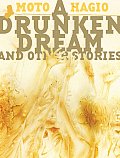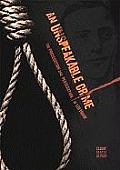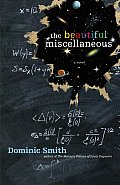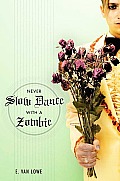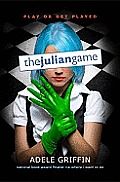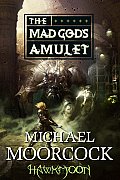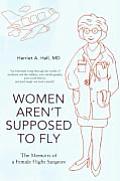Link to this review in the form of a comic strip by geneambaum tagged graphic novel • board book
Link to this review by geneambaum tagged romance • graphic novel • paranormal • short stories
First English-language collection of short comics by a highly respected and influential Japanese comics creator working for over four decades. Romance and the supernatural play a part in most stories, while others are a bit creepy or just downright weird. Big-eyed, all-American looking girls appear throughout.
My favorite story, “Iguana Girl,” features a lizard named Rika. Everyone else thinks she looks like a beautiful girl, but when her mother looks at her she sees a lizard.
The book includes an extensive interview with Hagio that originally ran in The Comics Journal.
Why I picked it up: Moto Hagio is one of the founders of shojo manga. I’ve discovered that I really enjoy early manga, and I was eager to see how this book fit with the rest of Fantagraphics’ line.
Why I finished it: The unexpected ending of the second story, “Girl on Porch with Puppy,” about a girl who thinks differently from the rest of her family.
I’d give it to: Robin Brenner of noflyingnotights.com fame, if she hasn’t read it already. Robin introduced me to my favorite Shojo title, Emma, and even if she’s already read this, it would give me a chance to show her she’s been a good influence on the breadth of my manga reading.
Link to this review by sarahhunt tagged history
The true story of the shocking murder of a young female worker in 1913 Atlanta leads to factory superintendent Leo Frank being tried, despite ample evidence that he didn’t commit the crime. The high emotions on all sides of the case ended up leading to the founding of the Anti-Defamation League and the re-founding of the Ku Klux Klan.
Why I picked it up: Recommended by a widely-read colleague.
Why I finished it: The way the lives of both the victim and Leo Frank were destroyed was gut-wrenching. It was clear at the time that Frank was selected as the main suspect because the court needed to convict an important person to match the horror of the crime. (Frank was more important than the other main suspect, a black janitor.) It was also significant that Frank was a Northerner, a Jew, and a supervisor, all groups that were being blamed for hard times in the South.
I’d give it to: Emily, who will appreciate that the author was inspired by both her husband’s work as an expert witness at criminal trials and his concerns about the justice system. And Inga’s religious ed class at the Unitarian Universalist Church. This book is written for and marketed to teens, but the court case is very disturbing, the hate is very raw, and I learned that antisemitism also had a sexual component. Inga would be ready to talk to her students about how to turn the strong feelings the book inspires into positive social action.
Link to this review by flemtastic tagged literary • coming of age
Nathan Nelson’s father is a genius. He tries to pass on his IQ to Nathan by drilling facts into him and sending him to academically-themed camps. He’s failed not only at turning Nathan into a scientific genius but also at creating a strong connection with his son. Then a serious car accident leaves Nathan with synesthesia, and he finds he can see and taste the words he hears. He can also perfectly remember it all, including entire TV shows, with proper inflection and timing. He goes to an institute for those with special talents where he meets others like himself and tries to figure out how to best use his new gift. But a terminal illness changes his family’s static dynamics and leaves Nathan struggling to find his place in the world.
Why I picked it up: An emailed recommendation from an Unshelved Book Club reader.
Why I finished it: The passages about Nathan’s relationship with his distant father. In the first pages of the book there’s a clear disconnect between them as they react differently to viewing a solar eclipse.
I’d give it to: Fans of Anne Tyler’s books like The Accidental Tourist who appreciate how she captures strange family dynamics. My mother who would appreciate the power of this book as it gradually builds a description of Nathan’s parents’ complex marriage .
Link to this review by gwen tagged paranormal • coming of age
As the ending of Middle School draws to a close, best friends Margot and Sybil write a manifesto of goals they each want to accomplish in high school: get a car, find a boyfriend, become popular.
Three years later they’ve achieved nothing! At a carnival one night, most of the other students are turned into zombies (Margot and Sybil aren’t there). At school, Principal Taft asks the girls to continue to go to class and tells them how to stay alive.
Margot and Sybil now rule the campus. They can now attain their goals, but only if they can survive
Why I picked it up: The zombie on the cover is wearing a yellow suit and holding a dead bouquet of purple roses.
Why I finished it: The scene where two boys who are still human blindfold Margot, take her to a basement, and ask her how she is still human. I laughed when they called her “Zombie Master.”
I’d give it to: Amanda, who would love that the zombies are afraid of the gym teacher but eat rats during class. Anyone who loves wiping away tears while laughing hysterically — this book really bites!
Link to this review by flemtastic tagged coming of age
Raye is on scholarship at an exclusive private school. Natalya, a wise straight-shooter, is her only friend. (Plus Nat’s mom makes a killer White Borscht.) Then Raye gets to know Ella, a member of the in-group, and hopes things might be changing. Ella suggests they prank Julian, a hot boy at a nearby all-boys school. Things go badly. Raye confesses and apologizes to Julian, earning Ella’s enmity. Ella soon begins a cruel online campaign against Raye.
Why I picked it up: The striking blue hair and green gloves on the cover.
Why I finished it: Raye is clearly insecure. But as her world disintegrates, she is able to bear it because of Natalya and her mother.
I’d give it to: Kaki, who is well-behaved but liked Mean Girls. Some of my sons‘ less-cautious Facebook friends, who need to learn that digital information posted on the internet lives forever.
Link to this review by geneambaum tagged thriller • fantasy
Dorian Hawkmoon, Duke of von Köln, sworn enemy of the Dark Empire of Granbretan, and his companion Oladahn are trying to return to the besieged Castle Brass and their allies. But in the dead city of Soryandum, where they seek shelter, they find the empire’s pitiless troops in their beast-shaped helms. The Order of the Bor, under command of the traitorous Frenchman D’Averc, captures Oladahn and will kill him if Hawkmoon doesn’t give himself up by sunset. The bizarre, secretive denizens of the city also need Hawkmoon’s help.
Why I picked it up: I’m hungry for short, action-packed novels, and I jumped at the chance to reread this book. (I enjoyed it as a teen but remember little about it.)
Why I finished it: This description of Hawkmoon, on page two, reminded me that Moorcock was the pre-China Miéville king of genre bending: “…the thing most remarkable about his appearance was the dull black jewel sunk into his forehead just above and between his eyes, a stigmata he owed to the perverted miracle workings of the sorcerer-scientists of Granbretan.”
Plus the action is nonstop. Hawkmoon and Oladahn face mad pirates, an insane god, betrayal, and the mass of Dark Empire troops that surround Castle Brass as Hawkmoon slowly comes to accept his role as an agent of the Runestaff.
I’d give it to: Teenagers like I was, once, who enjoyed Lloyd Alexander’s Prydain books but are ready for something bloodier and more philosophical, and would be reminded of Alexander’s Gurgi when reading about Moorcock’s beastman, Oladahn, though the latter doesn’t have much sense of humor.
Link to this review by davidtomashek tagged history • biography
Even as a child in the 1950’s, Harriet wanted to be a doctor. She faced a society where female doctors were extremely rare. Her college advisors told her she would have to settle for being a lab technician and acted surprised when she was accepted to medical school. There she faced sexism both overt (another woman was told she didn’t belong there and had taken a man’s place) and subtle (students were required to wear coats and ties). This continued in the military, where a fellow flight surgeon refused to work with a woman. Dr. Hall faced it all with grace and humor, showing she could more than succeed even though she “lacked a certain set of dangly bits.”
Why I picked it up: I saw the book on her website, SkepDoc.
Why I finished it: The book is a long string of medical and military anecdotes that are funny, fascinating, and sometimes tragic. During her internship, she sewed a drunk’s ear back on without anesthesia. Another time, a woman brought her dog in for an examination because “she wouldn’t think of waking her veterinarian at that time of night.”
I’d give it to: My friend Sylvia, who once made me read Beryl Markham’s West With The Night. I am giving it to Megan, a pilot and champion equestrian (shhh, don’t tell her).


